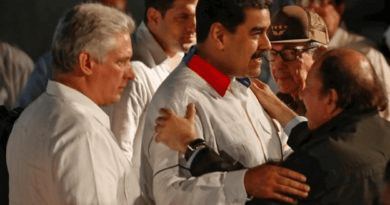
By Circles Robinson
HAVANA TIMES – Modern day dictatorships like to portray themselves as democratically reelected governments, but they do not fool anybody who spends a few minutes studying the conditions of their elections.
I say this despite being very aware of the electoral circuses that occur in the United States where the dance of many millions of dollars often determines the candidates and the outcome.
The cases of Nicaragua, Cuba and Venezuela are excellent examples of how dictatorships attempt to justify their never-ending rule. They are not alone in the world, but Cuba and Nicaragua are the main focus of our publication and Venezuela is also covered and it is a close ally of both.
In Venezuela, we just saw the main opposition candidate Maria Corina Machado, who received over 92% in a recent primary, disqualified from running in what are the still unscheduled 2024 presidential elections. For good measure, Henrique Capriles, who has run two times previously, was also banned from being a candidate. Nicolas Maduro was nice enough to allow some less popular opposition politicians run in elections.
In Nicaragua, Daniel Ortega and Rosario Murillo, saw themselves as highly unpopular when the 2021 presidential elections were approaching. So, as to not take any chances of being removed from power, they jailed or exiled all the potential opposition candidates, and later annulled their Nicaraguan citizenship for good measure. The rulers “won” a landslide victory with a very low turnout against a few friendly candidates they allowed to take part in the farce. The next edition of the charade is scheduled in 2026.
In the case of Cuba, not even the faintest chance of an electoral defeat is permitted as the population doesn’t vote for their “president”. As a one-party state, the president is decided internally by the Communist Party leadership, and then ratified by its legislators. In one-party states (which is the direction both Venezuela and Nicaragua are headed) there is no pretention of facing the voters in a fair election in which they could risk losing power. In Cuba, the same party/government has been in power for 64 years and hopes to make it to a hundred despite the disastrous situation of their country, which they blame on the US embargo.
In all three cases I don’t think very many of their own supporters or officials believe they could win a fair election with national and/or international observation. Sadly, those benefitting from the dictatorships don’t seem to mind “winning” by hook or crook.
Meanwhile, all three of these dictatorships share in common a mass exodus, especially of the under 40 generations. While the three governments always claim to rule for the benefit of their people, and always act with the best of intentions for them, voting with one’s feet speaks for itself, mortgaging their country’s future.
Read more from Circles Robinson here on Havana Times.




